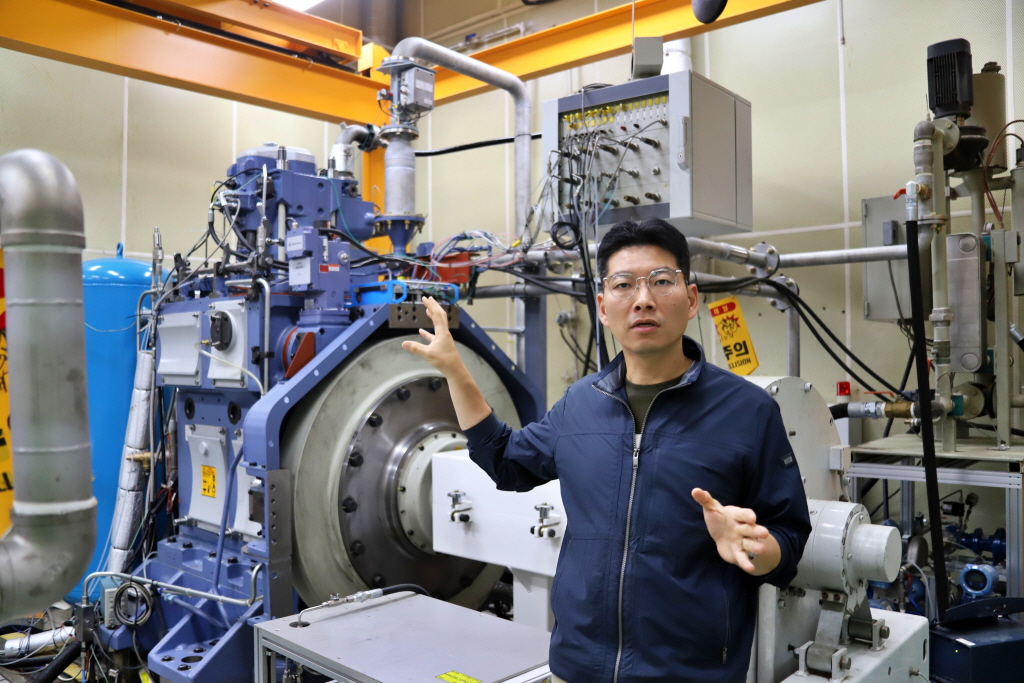과학기술정보통신부 산하 한국기계연구원(원장 류석현) 박철웅 책임연구원 연구팀은 한국선급, HD현대중공업, HD한국조선해양, 선박해양플랜트연구소, 군산대학교와 공동연구를 통해 암모니아를 연료로 사용하는 선박용 LNG-암모니아 혼소 엔진 연소 기술 실증을 전북 군산 한국선급 그린쉽 기자재 시험·인증센터에서 성공적으로 진행 중이다.

▲기계연 박철웅 책임연구원이 선박용 MW급 LNG-암모니아 혼소 엔진 연소 기술에 대해 설명하고 있다.
기계연, 선박용 MW급 LNG-암모니아 혼소 엔진 연소 기술 실증
미래의 재생 가능 에너지원인 암모니아를 연료로 사용하는 MW급 선박용 엔진 연소 기술이 국내 최초로 현장 적용되며, 글로벌 친환경 선박 엔진 시장 경쟁력 제고에 박차를 가할 것으로 기대된다.
과학기술정보통신부 산하 한국기계연구원(원장 류석현) 박철웅 책임연구원 연구팀은 한국선급, HD현대중공업, HD한국조선해양, 선박해양플랜트연구소, 군산대학교와 공동연구를 통해 암모니아를 연료로 사용하는 선박용 LNG-암모니아 혼소 엔진 연소 기술 실증을 전북 군산 한국선급 그린쉽 기자재 시험·인증센터에서 성공적으로 진행 중이다.
이번 연구는 해양수산부 ‘2,100마력급 LNG-암모니아 혼소 엔진 개발’ 과제의 지원을 받아 수행됐다.
연구팀은 암모니아를 선박용 엔진 내 연소실 안으로 고압 분사하고 안정적인 연소를 유지해 높은 출력과 열효율을 구현했다.
암모니아는 유망한 탄소중립 연료이지만 연료공급시스템의 재료로서는 부식성과 독성 등의 우려로 관리가 어렵다.
또한 높은 점화 에너지가 요구되어 착화가 어렵고 느린 연소 속도로 불완전 연소가 증가해 엔진의 출력 및 효율이 감소하는 문제가 발생한다.
실증 중인 ‘선박용 MW급 LNG-암모니아 혼소 엔진’은 연료공급장치 내 오링(O-ring) 소재 변경을 통해 부식과 암모니아의 외부 누출을 방지하고, 고효율 연소를 가능하게 해 이산화탄소 배출을 50% 이상 저감하는 등 성능을 검증받았다.
연구팀은 암모니아 연료 분사 시기를 연소 속도에 맞춰 최적화했고 높은 에너지를 요구하는 착화 조건을 충족시켰다.
또한 고압의 암모니아 연료를 연소실에 직접 분사하고 공기의 혼합도를 높인 희박 연소를 통해 열효율 극대화하고 출력 성능 향상은 물론 배출물을 동시에 줄여 불완전 연소의 문제를 해결했다.
기계연 박철웅 책임연구원은 “선박용 MW급 LNG-암모니아 혼소 엔진 연소 기술은 선박용 엔진에서 배출되는 온실가스에 대한 규제를 만족하고 미래 조선시장의 주도권을 확보할 수 있는 독자적인 기술”이라며 “선박용 엔진은 물론 탄소배출 저감이 요구되는 자동차, 발전기 등의 동력원으로 확장 적용할 수 있도록 노력하겠다”고 밝혔다.